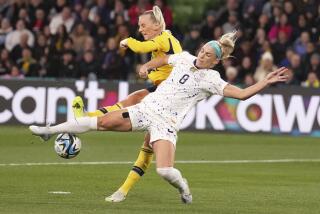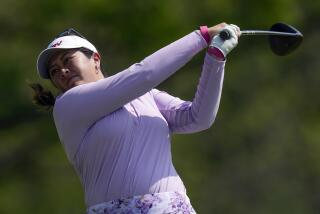TENNIS / JULIE CART : Evert Believes It’s Time for Some Changes
- Share via
Time was in sports when veterans spoke and rookies listened, hoping to glean useful advice.
These days, even recently retired players are lucky if anyone remembers their names. It’s a waste of resources and it’s rampant in tennis.
Chris Evert reflected on this the other day at the State Farm Evert Cup.
“I think the tour has not done a good job of using its resources. No one has contacted us,” she said, echoing what Martina Navratilova has said since retiring last November.
“Mary Pierce is the only player who has sought me out. We have a pretty good relationship. But she’s the only one. There are too many people around them. Too many people are telling them that everyone wants a piece of them. They don’t trust anyone. They think we want something from them.”
It’s a mystery why any of today’s players believe Evert or Navratilova could gain something from them, but it’s indicative of the prevalent belief peculiar to an individual sport: Everyone is a potential opponent.
During her first year on the tour, Evert was frozen out by other players. No one talked to the teen-age star. Finally, Billie Jean King called a meeting of top players and urged them to lighten up, telling them that young Evert was good for the game.
“Billie Jean has always had the ability to look into the future and see the big picture,” Evert said. “Players today should begin to think about what’s good for the tour and for the game.”
*
Evert has been asked to be on the board of directors of numerous foundations, but the only offer she has accepted has been from the WTA’s board. It’s hardly a figurehead position.
Last week’s quarterly meetings at Indian Wells were the first of the year and the agenda couldn’t have been more packed. Major topics were updating the ranking system and reworking the 1996 schedule.
The WTA’s complex ranking system has not been changed since 1982 and is so complicated that fans have little clue how the weekly rankings are devised.
Anne Person Worcester, CEO of the tour, would like to see a system that rewards players for entering more tournaments and encourages top players to face each other more often.
The more thorny problem is the schedule, which everyone agrees should be compressed and made more manageable, so that one day tennis might mimic other sports and operate with an identifiable season.
The months being considered for the off-season are December and January. But no one wants to ask the Australian Open to rework all its sponsor and television contracts and move the season’s first Grand Slam event to March.
Some other tournaments would be axed or moved. Given the current sponsor climate, who wants to sever already tenuous ties?
The Lipton tournament in two weeks is an early battleground. The only non-Slam event that brings the men and women together for 10 days, Lipton is at once a premiere event and a pain in the backside. The men want Lipton to cut back to one week, to ease Davis Cup scheduling. The women like it for the prize money and the exposure.
Evert’s passion about women’s tennis is tempered with a realism that the game is not fully well.
“The way I look at it, it’s definitely in a lull right now. It’s flat,” she said. “We’ve had it so good for so long. But I like what I see in the future--Venus Williams, Anna Kournikova, Martina Hingis--it could all turn on a dime. I’m not one of the panicky ones.”
More to Read
Go beyond the scoreboard
Get the latest on L.A.'s teams in the daily Sports Report newsletter.
You may occasionally receive promotional content from the Los Angeles Times.











